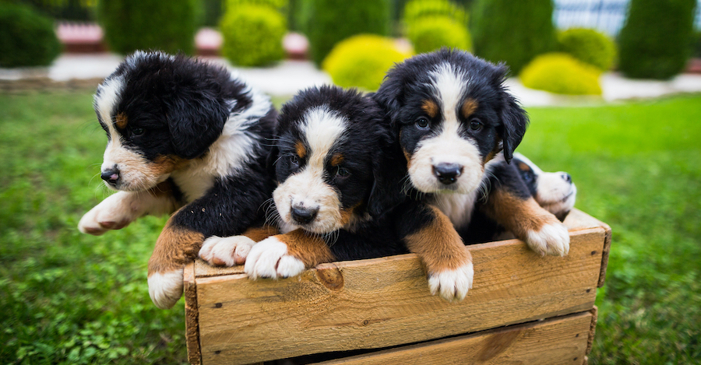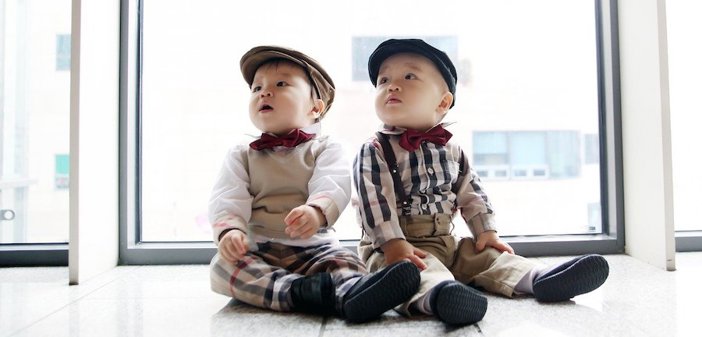
If we clone a cat or dog, what happens to their personality?
October 24, 2005

- Related Topics:
- Cloning,
- Personality traits,
- Futuristic science
A middle school student from California asks:
"If one day we can clone cats or dogs, what will happen to their personality, or their soul? Is it possible to clone a personality?"
In fact, dogs and cats have already been cloned. Genetic Savings & Clone, Inc., a former Bay Area company, cloned the first cat in 2001, and they used to clone cats for a mere $32,000 (before they went out of business). And in August 2005, the first dog was cloned by a lab at Seoul National University in South Korea
But did they clone their personalities? The short answer is that even though cloned animals look a lot like the original, they don't behave exactly the same.
One reason they don't have exactly the same personality is because cloning isn't like you see in the movies — a clone is not the same age as the original. It doesn't have the same memories or experiences. It only shares the same DNA.
To understand what this means, let's first talk a little about what DNA is, and about how you make a clone.

DNA and Cloning
DNA is found in every living cell and provides the instructions for each cell to do its job. It is the “blueprint” for how to build and run an organism.
You get half of your DNA from your mom and half of your DNA from your dad. In contrast, a clone gets all of its DNA from a single animal (or plant, or bacteria, or other living thing).
To clone an animal like a dog or cat, you need its DNA. Where do you find the DNA? In a compartment found in almost every cell called the nucleus.
When an animal is cloned, scientists take cells from a "donor" animal, such as a dog (as shown in the image below). Then, they take an unfertilized egg from another dog and remove its nucleus. This egg is now denucleated — it is missing its nucleus.
Scientists then put the single cell from the donor (or just its nucleus) into the denucleated egg. This process is called nuclear transfer.
The egg (now called the "cloned embryo") is then put into a surrogate mother. There the egg grows and divides just like an egg that has been fertilized by a sperm. This produces a baby animal with the exact same DNA as the adult donor.

So what does it mean to share the same DNA?
Like clones, identical twins also share the same DNA. So the clone can be thought of as an identical twin to the donor. Except in this case, the clone is also younger than the donor.
What this means is that the two won't share the same environment or the same experiences. It is really like identical twins that have been raised apart from one another.
Clones, like identical twins, probably look a lot alike. But if you know any identical twins well, you probably know that they do not always behave the same. Personalities are complicated.
DNA and Personalities
Certainly part of how we act is determined by our DNA. Some of the best evidence for this is when we look at identical twins separated at birth. What we find is that they share some personality traits.
For example, if one twin worries a lot, the other is likely to be a worrier too. Same goes for optimism, depression, how outgoing they are, and all kinds of behaviors. If personality were all from experience, they'd be completely different.
But they're not. This means that DNA has an important role to play in personality. And it may play an even bigger role in animals like cats and dogs. Some researchers think that cats' genes determine most of their behavior. Dog breeders find that puppies often act much like their parents.

But DNA isn't the whole story either. Our experiences and memories also help determine how we act. For example, if a curious child eats a poisonous berry and gets sick, they might become less curious in the future. And if a friendly and outgoing Labrador retriever is abused, it may become shy or angry.
So will the cloned and donor animals act exactly the same? Probably not. They will grow up at different times and have different things happen to them as they grow up.
For example, if a cloned dog gets sprayed by a skunk, he might become more nervous than the donor dog (at least when he sees a skunk!). Even though they share the same DNA, Lassie Junior won't act exactly like Lassie.
Cloning and Ethics
Now the question about the soul digs a bit into the more ethical concerns of all of this. Scientists can't really say anything about a cloned animal's soul because, well, they've never seen a soul. If a scientist can't observe it, there isn't any way for the scientist to study it.
There are other ethical issues that are worth thinking about too. I will only list a few here.
First, cloning still isn't perfect. Some cloned animals have developed serious health problems and died early. Newer methods of cloning to try to avoid these problems are already being worked out, and initial results for cloned cows and cats look promising. But scientists will not know the long-term health effects until many cloned animals have grown up (or died early).
Second, cloning your cat costs $32,000 right now. And dogs are probably going to cost even more. With so many other problems in the world, is this a good use for this money?
Third, millions of dogs and cats are already given up to shelters or left on the street to die. Is it wise to create more pets just to have them be genetically identical to one's beloved pet? Or is the right thing to do to adopt a pet that would otherwise be killed? There are many questions worth serious thought and discussion.

Dr. Kim Matulef
When this answer was published in 2005, Kim was a postdoctoral fellow in the Department of Molecular and Cellular Physiology, studying chloride ion channels and transporters in Merritt Maduke’s laboratory. Kim wrote this answer while participating in the Stanford at The Tech program.
 Skip Navigation
Skip Navigation
